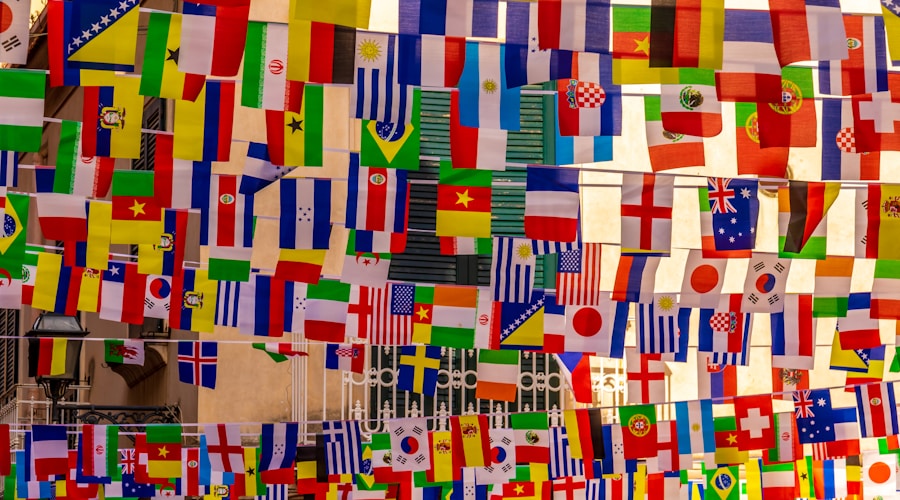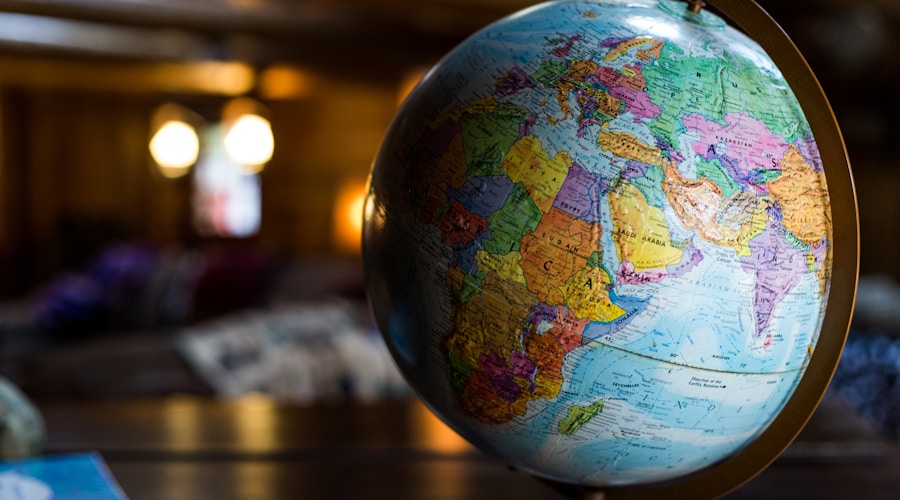Welcome to our exploration of the role of cultural exchange in broadening social horizons. In today's interconnected world, the exchange of ideas, traditions, and values across different cultures has become increasingly important. Whether it's through language, art, music, or cuisine, cultural exchange has the power to shape our understanding of the world and unite us as a global community.
As Maya Angelou once said, "Perhaps travel cannot prevent bigotry, but by demonstrating that all peoples cry, laugh, eat, worry, and die, it can introduce the idea that if we try and understand each other, we may even become friends." This sentiment captures the essence of cultural exchange and its potential to break down barriers and foster mutual understanding.
So, let's embark on this journey together and explore the ways in which cultural exchange can enrich our lives and expand our social horizons. Whether you're a seasoned traveler, a curious learner, or simply someone with an open mind and heart, there's something in this exploration for everyone. Let's delve into the beauty and power of cultural exchange, and discover the transformative impact it can have on our global society.
Introduction to Cultural Exchange
Cultural exchange is a powerful tool for broadening our understanding of the world and the people in it. It involves the sharing of ideas, traditions, art, language, music, and cuisine across different societies and countries. This exchange allows individuals to learn from one another and gain a deeper appreciation for the diversity that exists in our global community.
As author Pico Iyer once said, "We travel, initially, to lose ourselves; and we travel, next to find ourselves." When we engage in cultural exchange, we open ourselves up to new perspectives and ways of life, which can be incredibly enriching. It allows you to gain insight into different worldviews and helps break down stereotypes. So, cultural exchange does not simply expand your knowledge; it also helps to build empathy and understanding.
In the words of philosopher Jiddu Krishnamurti, "The highest form of human intelligence is to observe yourself without judgment." Cultural exchange encourages this kind of introspection by exposing you to customs, beliefs, and lifestyles that may be different from your own. It challenges you to reflect on your values and beliefs, and to consider the validity of other perspectives.
By participating in cultural exchange, you can develop a more nuanced understanding of global issues, fostering a sense of interconnectedness with people around the world. As you engage with different cultures, you will come to realize that despite our differences, we share similar fundamental desires and aspirations.
Cultural exchange is not just about learning from others; it's also about sharing your own culture with the world. By doing so, you can help break down barriers and promote unity. As author and activist Elissa Patel stated, "Cultural exchange allows us to celebrate our differences while also finding common ground."
In the following sections, we will delve deeper into the various facets of cultural exchange and explore how they contribute to broadening social horizons. Through understanding the significance of cultural exchange, we can work towards creating a more unified and peaceful global society.
Sharing Traditions Across Borders
One of the most beautiful aspects of cultural exchange is the ability to share traditions across borders. When you open yourself up to learning about and participating in the traditions of another culture, you are not only expanding your own horizons but also creating a bond with the people from that culture.
As author Travis Bradberry once said, "Cultural exchange promotes peace and understanding between nations." When we take the time to learn and appreciate the traditions of others, we are fostering a sense of unity and respect that transcends borders. Whether it's celebrating festivals, participating in rituals, or simply understanding the significance of certain customs, sharing traditions allows us to form connections with people from different parts of the world.
In the words of cultural anthropologist Margaret Mead, "Sooner or later, we will have to recognize that the Earth has rights, too, to live without pollution. What mankind must know is that human beings cannot live without Mother Earth, but the planet can live without humans." By sharing traditions across borders, we are acknowledging the richness of our planet's cultural tapestry and the importance of preserving and cherishing it.
When you open yourself up to the traditions of others, you are not just learning about a different way of life, but you are also gaining a deeper understanding of the values and beliefs that shape that culture. This understanding can lead to mutual respect and appreciation, and it can help break down stereotypes and misconceptions.
In the words of ethnographer and social activist Zora Neale Hurston, "Research is formalized curiosity. It is poking and prying with a purpose." Sharing traditions across borders allows us to engage in a form of "research" that is driven by genuine curiosity and a desire to connect with others on a deeper level.
The act of sharing traditions across borders is a powerful way to foster empathy, understanding, and unity. It allows us to recognize and celebrate the diverse ways in which people around the world find meaning, joy, and fulfillment in their lives. By embracing the traditions of others, we are not just enriching our own lives, but we are also contributing to a more harmonious and interconnected global community.

Learning Through Language and Literature
Language and literature are essential elements of cultural exchange, allowing individuals to immerse themselves in the stories, poetry, and language of different cultures. Through the study of foreign languages and literature, you can gain a deeper understanding of the history and traditions of other societies.
As the acclaimed author, Haruki Murakami, once said, "If you only read the books that everyone else is reading, you can only think what everyone else is thinking." This quote beautifully encapsulates the idea that exploring literature from different cultures can expand your perspective and enrich your worldview.
By learning a new language, you gain access to the thoughts and experiences of a different community, enabling you to communicate and connect with a wider range of people. Moreover, as novelist Charlene Spretnak noted, "To learn another language is to possess a second soul." Learning a language opens up new ways of thinking and expressing oneself, fostering empathy and understanding towards others.
When you engage with literature from diverse cultures, you expose yourself to new ideas and viewpoints. As writer Jhumpa Lahiri affirmed, "That's the thing about books. They let you travel without moving your feet." Literature allows you to step into the shoes of people from different backgrounds, providing you with unique insights and fostering a sense of empathy towards individuals from other cultures.
The Impact of International Art and Music
Art and music have a unique ability to transcend language barriers and connect people from different parts of the world. Exposing yourself to international art and music can truly broaden your social horizons, allowing you to gain a deeper understanding of diverse cultures and perspectives.
Expanding Cultural Awareness
By immersing yourself in the art and music of different cultures, you can gain valuable insights into the traditions and values of a society. As the famous musician Yo-Yo Ma once said, "Music is one way to understand how you fit into the world".
Breaking Down Stereotypes
Experiencing art and music from other countries can challenge stereotypes and misconceptions. Renowned artist Pablo Picasso famously said, "Art washes away from the soul the dust of everyday life", highlighting the transformative power of art in fostering understanding and empathy.
Encouraging Empathy
Listening to music or appreciating art from different cultures can evoke emotions and empathy. Acclaimed novelist Haruki Murakami once said, "If you only read the books that everyone else is reading, you can only think what everyone else is thinking", emphasizing the importance of exploring diverse literary and artistic works to broaden one's perspective.
Exposing yourself to international art and music can truly open your mind to new possibilities and enrich your social interactions. As you immerse yourself in the creativity of different cultures, you'll find yourself more empathetic, open-minded, and better able to connect with people from all walks of life.
Building Bridges with Food and Cuisine
Building Bridges with Food and Cuisine
When it comes to cultural exchange, food and cuisine play a significant role in bringing people together. Trying new dishes from different parts of the world allows you to experience a taste of someone else's culture. As Anthony Bourdain once said, "Food is everything we are. It's an extension of nationalist feeling, ethnic feeling, your personal history, your province, your region, your tribe, your grandma. It's inseparable from those from the get-go."
By sharing meals with people from other cultures, you not only get to indulge in new flavors but also gain a deeper understanding of their traditions and way of life. Cooking and eating together can create a sense of unity and connection, breaking down barriers and fostering a spirit of inclusivity.
One of the most incredible aspects of food is its ability to unite people from different backgrounds. As you explore new culinary experiences, you not only broaden your palate but also your understanding of the world around you. It's an opportunity to learn about the history, geography, and social customs of a region through its food.
On your journey of cultural exchange, be open to trying new cuisines and embracing the stories behind them. As Maya Angelou once said, "I mean, it's all in the food. It's all a part of it." So, go ahead, cook a new dish, or visit a local restaurant that serves traditional international cuisine. Open yourself up to the richness of diverse culinary traditions, and you'll find yourself building bridges to new cultures in ways you never thought possible.
Exchange Programs and Global Understanding
Exchange programs play a pivotal role in fostering global understanding and cultural appreciation. By living and studying in a different country, you have the opportunity to immerse yourself in another culture and gain a deeper understanding of its people, traditions, and way of life. As American author, Alex Tabarrok, puts it, "Exchange programs are a powerful way to break down barriers and build connections between people from different parts of the world."
Participating in an exchange program allows you to develop empathy and a broader perspective on global issues. It helps you realize that the world is much bigger than your immediate surroundings, and that people from different cultures have their own unique ways of thinking and living. As the famous anthropologist, Margaret Mead, once said, "Never doubt that a small group of thoughtful, committed citizens can change the world. Indeed, it's the only thing that ever has."
Through exchange programs, you also have the opportunity to challenge stereotypes and misconceptions about other cultures. When you interact with people from different backgrounds, you can debunk myths and preconceived notions, and instead, build genuine connections based on understanding and respect.
Furthermore, exchange programs can inspire personal growth and self-discovery. By navigating the challenges of living in a new culture, you can develop resilience, adaptability, and independence. According to global educator, Greg Mortenson, "Once you have traveled, the voyage never ends, but is played out over and over again in the quietest chambers. The mind can never break off from the journey."
Ultimately, exchange programs are a powerful tool for promoting global understanding and building bridges between nations. They allow you to become an ambassador of your own culture while learning and appreciating the values and traditions of others. Through this mutual exchange, you can contribute to a world that is united through cultural diversity and understanding.

Conclusion: A World United Through Culture
As we have explored throughout this article, cultural exchange plays a vital role in broadening our social horizons. It has the power to unite people from different backgrounds, fostering understanding and empathy. In the words of Ruth J. Simmons, "Cultural exchange can be a catalyst for humanizing and healing relationships."
Through sharing traditions, language, art, music, and cuisine, we create opportunities for connection and mutual respect. Every interaction becomes an opportunity to learn and grow, breaking down barriers and opening our minds to diverse perspectives.
By engaging in exchange programs and embracing global understanding, we can truly advocate for a world united through culture. Citizen diplomacy activist, Robert Alphin, puts it succinctly: "Cultural exchange holds the key to building bridges of peace and understanding between nations."
So, as you continue to explore the world and engage with people from different cultures, remember the profound impact cultural exchange can have. It is through your openness and willingness to connect that we can truly create a world united through culture.
Let us celebrate our differences and embrace our similarities, for it is through cultural exchange that we can foster a future of unity and harmony.
Conclusion
As we bring our discussion to a close, it's clear that the role of cultural exchange in broadening social horizons cannot be overstated. Embracing and respecting different cultures enriches our lives and promotes global understanding and unity.
You've learned how cultural exchange allows us to share traditions across borders, learning through language and literature, and appreciate the impact of international art and music. In the words of Maya Angelou, "Perhaps travel cannot prevent bigotry, but by demonstrating that all peoples cry, laugh, eat, worry, and die, it can introduce the idea that if we try and understand each other, we may even become friends."
By building bridges with food and cuisine, we create opportunities for people to come together and bond over shared experiences. As Anthony Bourdain once said, "Food is everything we are. It's an extension of nationalist feeling, ethnic feeling, your personal history, your province, your region, your tribe, your grandma. It's inseparable from those from the get-go." Through food, we discover the stories and traditions of others, fostering unity and empathy.
Exchange programs play a crucial role in promoting global understanding and breaking down stereotypes. As Malala Yousafzai, the youngest-ever Nobel Prize laureate, said, "Let us make our future now, and let us make our dreams tomorrow's reality." By participating in exchange programs, we open ourselves up to new perspectives and experiences, paving the way for a more connected and united world.
In conclusion, cultural exchange has the power to unite us, to broaden our social horizons, and to foster empathy and understanding. As you go about your daily life, remember the words of Mahatma Gandhi: "Our ability to reach unity in diversity will be the beauty and the test of our civilization." By embracing cultural exchange, you are contributing to a world where diversity is celebrated and unity is achieved.

2Travis Bradberry, Emotional Intelligence 2.0 (2009)
3Margaret Mead, Coming of Age in Samoa (1928)
4Zora Neale Hurston, Mules and Men (1935)
5Haruki Murakami, Norwegian Wood (1987)
6Charlene Spretnak, The Spirit of Place: A Workbook for Sacred Sites (1995)
7Jhumpa Lahiri, The Namesake (2003)
8Yo-Yo Ma, "Transcending Borders with Music", 2019
9Pablo Picasso, "Pablo Picasso: Metamorphoses", 2010
10Haruki Murakami, Norwegian Wood, (1989)
11Anthony Bourdain, Kitchen Confidential: Adventures in the Culinary Underbelly (2000)
12Maya Angelou, Wouldn't Take Nothing for My Journey Now (1993)
13Alex Tabarrok, Launching the Innovation Renaissance (2011)
14Margaret Mead, Culture and Commitment (1970)
15Greg Mortenson, Three Cups of Tea (2006)
16Ruth J. Simmons, Pursuing the Dream: What People Need to Know about the Principal Strategy (2014)
17Robert Alphin, Citizen Diplomacy: Responding to the Paradox of the 21st Century (2009)
18Maya Angelou, Wouldn't Take Nothing for My Journey Now (1994)
19Anthony Bourdain, Kitchen Confidential (2000)
20Malala Yousafzai, I am Malala (2013)
